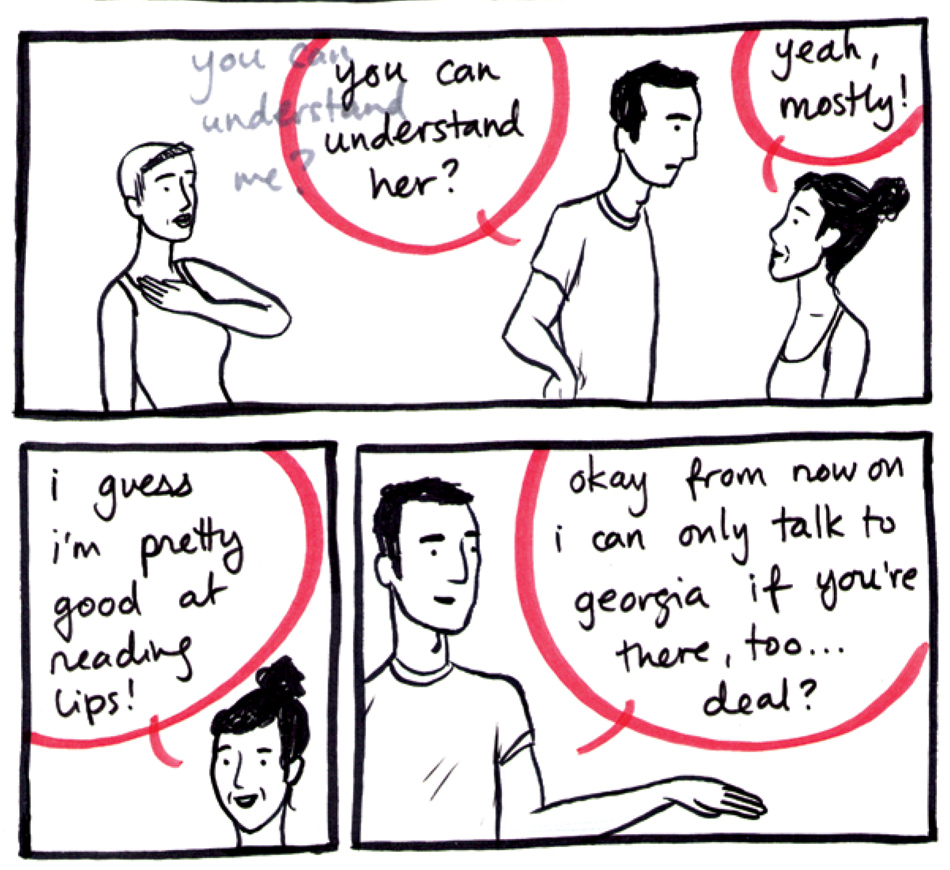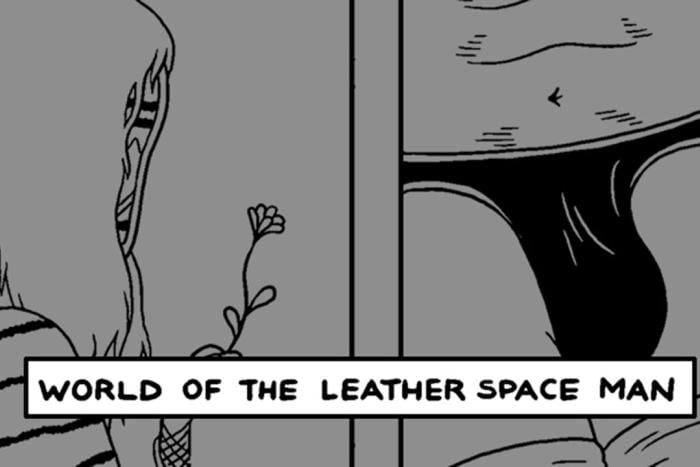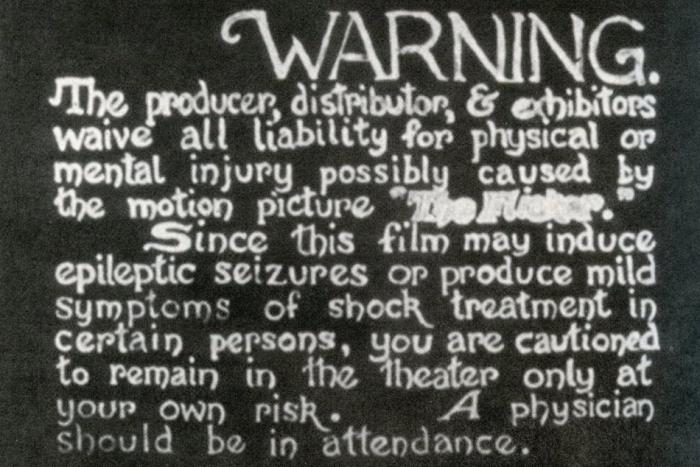For an interview like this one, speaking with the artist or musician in person is always preferred, but in Georgia Webber’s case there was an unusual complication. Last year, the young cartoonist (who just moved back to Toronto from Montreal) found that routine speech was becoming more and more painful, until the smallest talk could overpower her voice. The medical specialist who diagnosed her prescribed six months in silence, saying, yelling, singing, murmuring or muttering as little as possible.
Her ongoing comic DUMB, funded and toured with a successful Indiegogo campaign, documents this period of temporary disability, as Webber uses red lipstick to signal her condition, texts half-conversations to her friends amidst loud bars, and struggles to find a job while mute. It did give her an opportunity for formal experimentation: How to represent the ambient roar of background noise, or its absence, in a silent medium? Webber’s throat has mostly healed now, but she still answered my questions by hand just in case, sitting on an adjacent café stool. We could at least both laugh at the absurdity of it.
How did you get this vocal injury? What led up to it?
Short answer: I’m a vocal abuser.
You can laugh, it’s pretty hilarious. My official diagnosis is that I talk too much and I do it badly.
I have a history of throat problems, too. I’ve stopped talking once before due to strep throat (the seventh or eighth time I had it), but only for two days. Then I saw a doctor.
In my comic I start with the Toronto Comic Arts Festival, where I strained my voice last year (from having too much fun). I should have rested it afterwards, but I couldn’t imagine a way to do that, so I just kept going, and the pain kept getting worse, until it was constant and unbearable.
So it wasn’t like you tried to hit too high a note or some kind of trauma, an inherited condition or anything. Just strain that built up.
Nope, just a talker.
Were you given a range of treatments?
No, when I went to the ear, nose and throat specialist, he told me I could try changing my diet to eliminate acid reflux, which often affects people this way (not as extremely, but still). I was told to stay hydrated and try not to stress too much. He gave me a referral for a speech language pathologist, but I didn’t hear from her for two months.
And how did you find that it altered your personal relationships? Because you mention in I think the third issue the social anxiety that comes out of this, how it changes the most basic interactions. You have to figure out a different way to talk to somebody at the bar. Working, or shopping, or dating…
People surprised me constantly. I felt like I was learning as much about them as I was about myself. For example, I learned really quickly who amongst my friends was good at lip-reading— everyone who wasn’t would nod with vague looks of confusion, say “oh” or “yeah,” whether appropriate or not. Some people leaned in really close to hear me, others immediately started whispering. And that all happened before the conversation itself even started. I have an endless wealth of bizarre interactions in my memory bank—this barely constitutes a spoiler. But to learn the depths of how it affected my relationships, the comic says it better.

Do you know about the composer John Cage? [Georgia nods.] His most famous work is the composition 4’33”, where the performer does nothing for four minutes and 33 seconds. But it’s not really silent—the idea is to frame these incidental noises. And he liked to tell a story about how he visited this anechoic chamber at Harvard (an anechoic chamber is one soundproofed in a way to go as close to absolute silence as possible). After coming out, he asked the researcher, “I heard two sounds, what was I hearing?” And supposedly the response was, “One of them was your nervous system, one of them was your blood circulating.” People actually question that story—there’s a suggestion that it might just have been tinnitus, that faint ringing in some people’s ears, but that’s still a sound produced by your own body. The basic point of the story is that sound and silence aren’t binary so much as a continuum. I was wondering if your experience altered the way that you listen, whether to people or background noise.
I alluded to it a moment ago, but I actually know that story and all about John Cage because I was already a sound nerd before this injury. I wouldn’t say that it altered the way I listen to everything, but it drastically shifted how much I listen to each person’s voice. They’re unique, like fingerprints, and the effect that they have is so much more powerful than we acknowledge. Think of the relief you feel when you recognize a loved one’s voice on the telephone, or the transcendent experience of listening to your favourite singer, or hearing your own voice recorded instead of traveling through your head to your brain. I missed my voice like a friend, I missed singing like a ghost limb. I missed the way I sounded in the world, so I paid extra attention to the other voices I would miss if they ever disappeared.
Before I came here I flipped through this book MP3: The History of a Format by Jonathan Sterne. There’s a part where he talks about noise, and he mentions an entire book about noise, by the French economist Jacques Attali, which argues that noise challenges the social order, so “power seeks to control it, or silence it, or make it so ever-present as to be banal.” But it’s also an “entropic or generative force.”
What I take from that quote is that it rings true for me, and I’d challenge you to apply the words about noise to your own voice. Is it noise or music? Suppressed, banal, entropic, constructive? When you answer, do you know? Or are you guessing?
These are questions I felt compelled to answer without mine, and not just once, but always. That’s a little of what’s coming in DUMB.
Why did you decide to self-publish the series, and raise the money for it through crowdfunding? And you partly used the money to tour—has it ever been difficult at big comics events? Because they’re kind of intensely, claustrophobically social.
Because being mute makes most jobs out of reach, I had to crowdfund to do this at all. I was on welfare and digging my debt-hole a little deeper every day, so I thought “now or never” and asked for help.
I have no problem socializing without my voice, and kind of love having the freedom to be around without participating actively. I’m a really social person by nature and it’s nice to be the opposite of that.
What’s that other project you alluded to earlier?
I’ve always got a ton of things on the go, but the other project I referred to is actually just another component of DUMB. I’m a sound nerd who lost my voice—is it any surprise that I’m working on an audio piece about it? I’ve also videotaped some of my silent conversations, and I have a pile of notebooks filled cover-to-cover with my written conversations and notes to myself from that time. I’m working on ways to share that.





